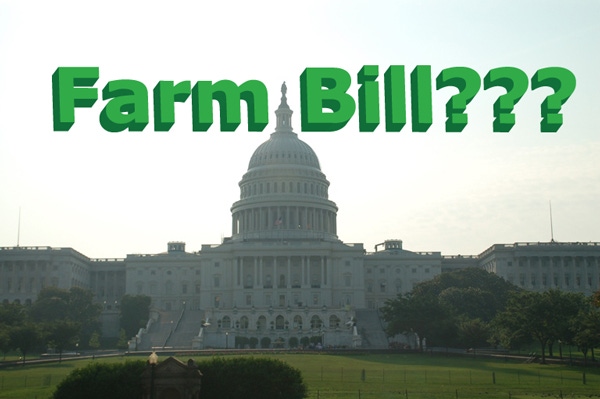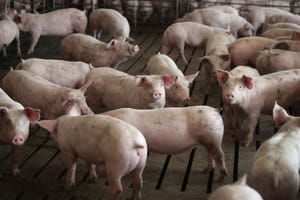Legislative Watch: Groups urges House to vote against harmful amendments; House to look at farm bill next week; chairmen discuss farm bill with Trump; food safety undersecretary nominated; ag exports down; White House asks for rescissions.

Over 300 national and state agricultural and producer organizations have sent a letter to the House of Representatives urging members to vote against any amendment to the farm bill that would hurt producers.
The letter says, “A core purpose of a farm bill at any time is to help the country’s farmers and ranchers weather factors beyond their control, including natural disasters, disease, and high and rising foreign subsidies, tariffs and non-tariff trade barriers. This is especially true during hard economic times.”
The organizations urge House members to oppose potentially harmful amendments especially those concerning crop insurance, sugar program and unworkable payment limitations. The groups say, “During a prolonged recession in agriculture, failure to pass a farm bill on time would undermine the financial security of America’s food, fuel, crop and fiber producers.”
Those signing the letter include the American Farm Bureau Federation, American Soybean Association, American Sugar Alliance, Farm Credit Council, National Association of Wheat Growers, National Corn Growers Association, National Cotton Council, National Council of Farmer Cooperatives, National Milk Producers Federation, National Rural Electric Cooperative Association and USA Rice Federation.
House plans to consider farm bill next week
The House of Representatives is planning on considering the 2018 farm bill (H.R. 2) next week. The House Republican leadership and House Agriculture Committee Chairman Mike Conaway (R-TX) have been meeting with Republican members to make certain there are enough Republican votes to pass the bill. It will take all Republican votes to pass the bill since Democrats have declared they will oppose the bill because of the provisions concerning the Supplemental Nutrition Assistance Program, rural development and commodity provisions.
The deadline for members to file amendments was this morning. It is expected hundreds of amendments will be filed. As of last night, amendments had been filed to modernizer the sugar program; repeal and replace the Waters of the U.S. rule; cut crop insurance companies’ target rate of return from the current 14.5% to 12%; strengthen prohibitions against animal fighting; and allow states to permit the intrastate distribution of custom-slaughtered meat to consumers, restaurants, hotels and grocery stores.
Ag committee chairmen meet with Trump on farm bill
The chairmen of the House and Senate agriculture committees — Congressman Mike Conaway (R-TX) and Sen. Pat Roberts (R-KS) — met with President Donald Trump and Secretary of Agriculture Sonny Perdue yesterday to discuss the importance of passing the farm bill this year. Conaway asked for the president’s help in passing the House bill.
President Trump told the chairmen that the tighter work requirement rules for SNAP recipients in the House Agriculture Committee’s bill was a move “in the right direction.”
Brashears nominated undersecretary for food safety
Mindy Brashears has been nominated by President Trump to be USDA’s undersecretary for food safety. Currently, Brashears is a professor of Food Safety and Public Health and the director of the International Center for Food Industry Excellence at Texas Tech University where she has focused her research on improving food safety standards to influence public health. She is past-chair of the National Alliance for Food Safety and Security and of the USDA multi-state research group.
Secretary of Agriculture Sonny Perdue says, “Dr. Brashears has spent decades finding ways to improve food safety standards through innovation, invention and leadership on research missions across the globe.”
Her nomination will go before the Senate Agriculture Committee for consideration.
Ag exports down first six months
According to USDA, agricultural exports are down 3% during the first six months of Fiscal Year 2018. From October 2017-March 2018, agricultural exports were $74.5 billion. The decline is a result of lower bulk commodity exports.
Soybean exports were down 19% by value and 14% by volume; corn, down 20% by value and 18% by volume; wheat, down 12% by value and 17% by volume; cotton is up 10% by value and 8% by volume. High value items such as red meat, poultry, tree nuts and wine have seen an increase in the first six months.
White House sends $15 billion rescission package to the Hill
The White House has sent a $15 billion rescission package to the Hill that targets funding the administration believes is no longer needed or has not yet been spent. The departments affected include USDA, Commerce, Energy, Health and Human Services, Housing and Urban Development, Justice, Labor, State, Transportation, and Treasury. It also affects various agencies including the Environmental Protection Agency.
Some of the proposed cuts in USDA include:
• APHIS: Cut $148 million from USDA’s Animal Plant Health Inspection Service for avian flu and bovine tuberculosis outbreaks that have not been used.
• Natural Resources and Conservation Service: Rescinds $356 million from conservation programs that were not extended in the 2014 farm bill and $144 million in unused funds for the Environmental Quality Incentive Program from fiscal years 2014 through 2017.
• NRCS: $656 million is proposed for NRCS including $107 million that was to be used for emergency watershed projects related to Hurricane Sandy that will not be used.
• Rural development: Biorefinery Assistance Program — This proposal would rescind $36 million in unobligated balances of which $92 million were available on Oct. 1, 2017. The Biorefinery Assistance Program, operated by the Rural Business-Cooperative Service, encourages the production of biofuels, renewable chemicals and bioproducts. These funds are in excess of amounts needed to carry out the program in Fiscal Year 2018.
• Forest Service: $16 million in proposed rescissions.
The House of Representatives is expected to consider the package later this month. The White House is expected to propose additional rescissions packages.
About the Author(s)
You May Also Like



